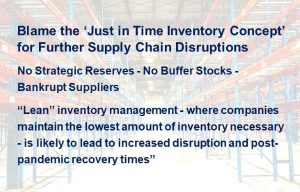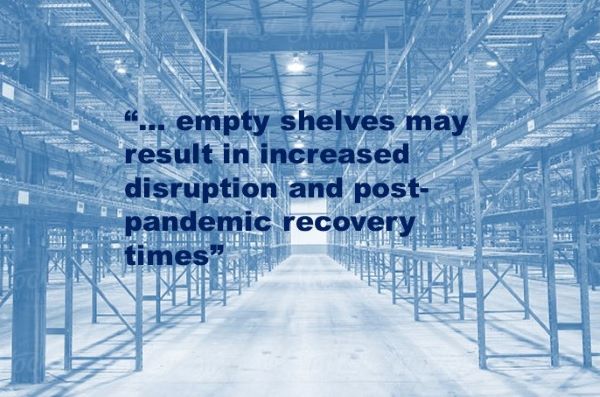Less than a third of companies are fully operational due to global work restrictions and lockdowns in response to the coronavirus pandemic, a survey has found.
The survey by RapidRatings found just 29% of companies can continue full operations in the current circumstances, and 57% are partially operational but concepts like “lean inventories” are exacerbating issues.
RapidRatings surveyed 1,300 private companies across industries and countries most impacted by Covid-19, including Italy, China, South Korea, Japan, the US, and countries in Eastern and Western Europe.
 “Lean” inventory management – where companies maintain the lowest amount of inventory necessary – is likely to lead to increased disruption and post-pandemic recovery times, the report said.
“Lean” inventory management – where companies maintain the lowest amount of inventory necessary – is likely to lead to increased disruption and post-pandemic recovery times, the report said.
Over half (59%) of US companies have insufficient inventory reserves on hand to continue shipping for more than two weeks after ceasing manufacturing.
Businesses with revenues in the $10m to $100m range are worst hit, with 76% unable to continue operating at full capacity, and 42% of those that have already closed facilities do not expect to re-open for another two to four weeks. A further 15% of respondents expect to be unable to open facilities for at least another month.
Almost two-thirds (64%) of respondents have a pandemic response policy in place – a number that sunk to 43% in Italy.
Nearly a third (32%) of respondents have already experienced supplier disruptions and 27% of companies have had difficulties acquiring masks or cleaning supplies (44% in Italy). Just 26% of respondents in China said they could be fully operational while working from home, compared to 37% in North America. However, only 7% of Chinese respondents were unable to operate at all, compared to 15% in North America.
 RapidRatings CEO, James Gellert, said: “We are only just starting to feel Covid-19’s impacts on supply chains. “Despite business continuity measures in place, many companies expect significant degradation in their ability to deliver in the foreseeable future.”
RapidRatings CEO, James Gellert, said: “We are only just starting to feel Covid-19’s impacts on supply chains. “Despite business continuity measures in place, many companies expect significant degradation in their ability to deliver in the foreseeable future.”
Meanwhile, a separate report from Achilles said more than 3,800 suppliers in its network – which brings buyers and suppliers together in the utilities sector – are at financial risk if the Covid-19 crisis lasts for more than six months. Products and services areas where suppliers are cited to be particularly at risk include rolling stock repair and maintenance (60%) and generators for power stations, as well as reactor core services (both 60%).
Also, a third of suppliers of installation and operation of energy plants and waste and recycling goods and services are at risk.
“The biggest issue that we hear in speaking with customers is cash flow. Suppliers are concerned that they will not have enough cash to weather the crisis. Many procurement organisations are working hard to identify where supply is at risk and to put continuity plans in place,” said Achilles. “Many plans centre around ensuring suppliers are able to survive the crisis financially. Some plans are focused on securing appropriate PPE (personal protective equipment) for staff and contractors.”
Source: CIPS.org/supply-management news


























